How to Extract Travel Data for Market Intelligence?
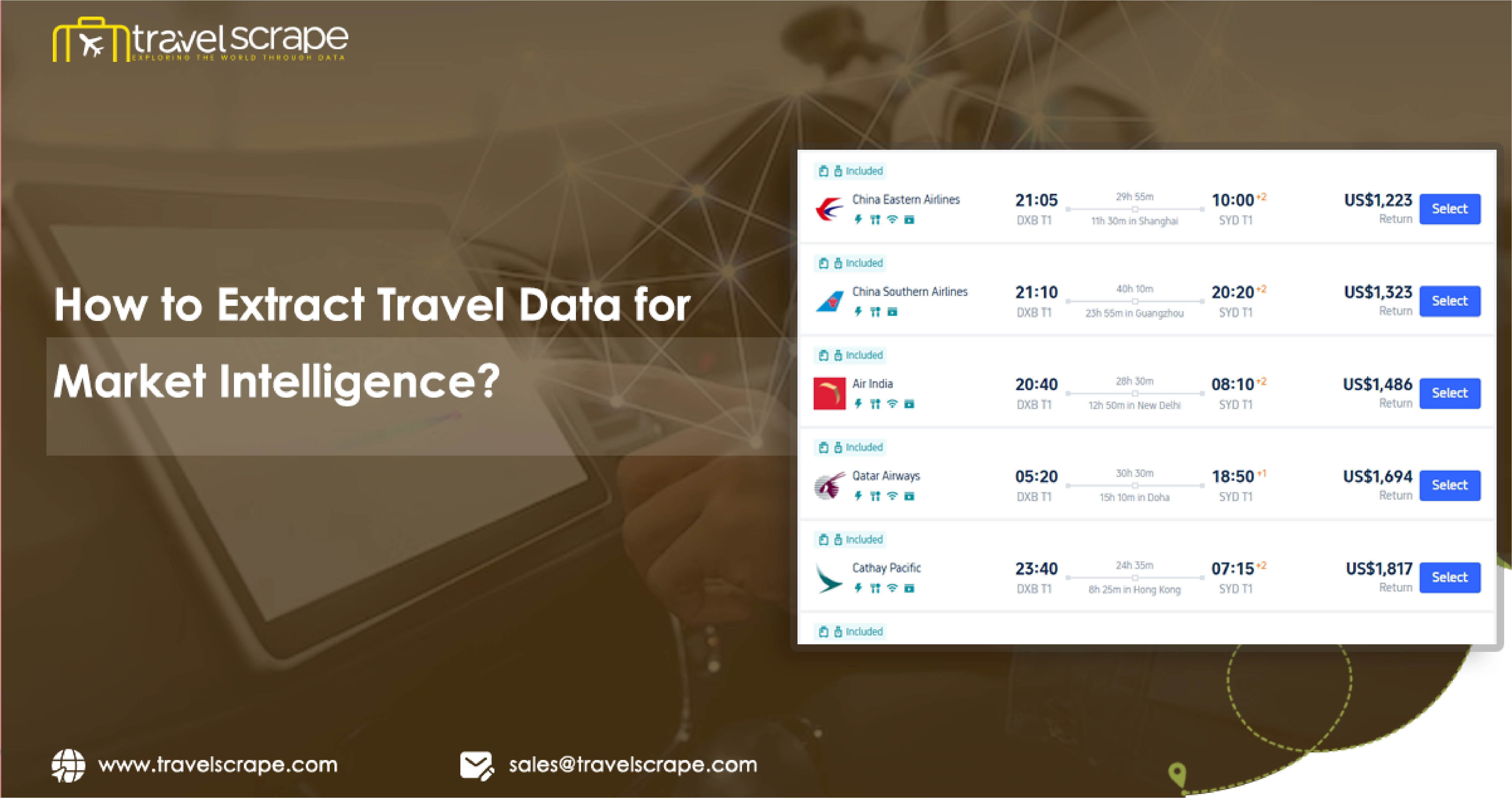
Introduction
In today’s fast-paced travel industry, businesses must stay ahead of trends, understand customer preferences, and monitor competitors to thrive. Extracting travel data for market intelligence has become a critical practice for gaining actionable insights. By leveraging advanced technologies like Travel Industry Web Scraping and Travel Scraping API, businesses can unlock the power of data to drive strategic decisions. Here’s a comprehensive guide on how to extract travel data for market intelligence effectively.
Why Extracting Travel Data is Essential?
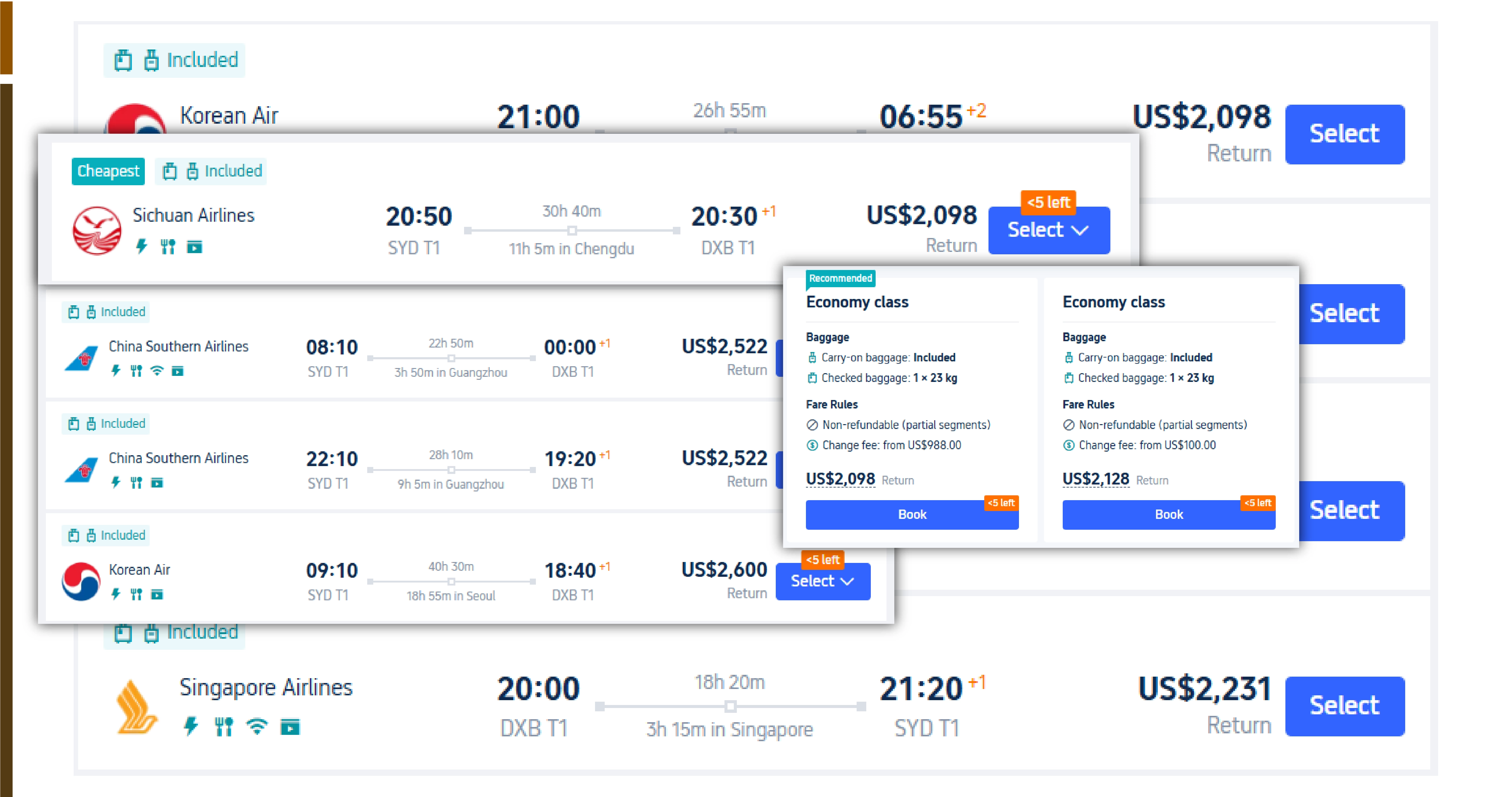
The travel industry is dynamic, with fluctuating prices, emerging trends, and changing customer behaviors. To maintain a competitive edge, companies need accurate and timely information. Extract Travel Data for Market Intelligence to:
1. Understand Market Trends: Gain insights into the latest travel preferences and seasonal demands.
2. Monitor Competitors: Analyze pricing, promotions, and offerings to strategize better.
3. Optimize Customer Experience: Tailor services to meet evolving customer needs.
4. Improve Operational Efficiency: Use data to streamline operations and enhance profitability.
The data derived from Travel, Airline, and Hotel Data Extraction empowers businesses to navigate the complexities of the travel sector with confidence.
Methods to Extract Travel Data
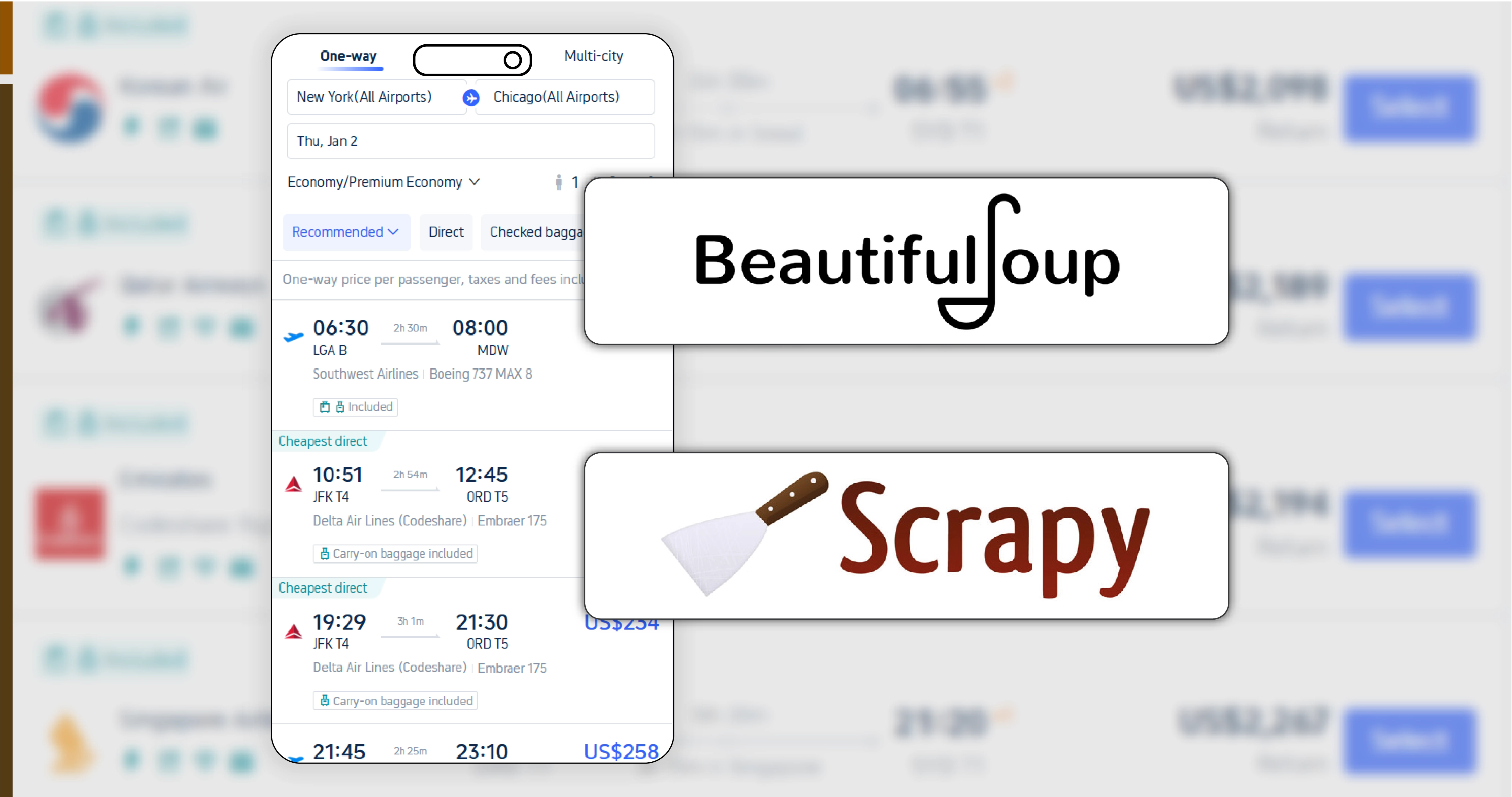
1. Data Scraping for Travel Market Trends and Analysis
One of the most effective methods for gathering travel data is web scraping. By using Travel Industry Web Scraping techniques, businesses can collect vast amounts of structured data from multiple sources such as:
- Airline websites for fare details and schedules.
- Hotel platforms for room availability and pricing.
- Travel aggregator platforms for package comparisons.
Tools like Python-based web scraping libraries (e.g., BeautifulSoup, Scrapy) and specialized Travel Scraping API services automate this process, ensuring accuracy and efficiency.
2. APIs for Seamless Data Integration
APIs are a powerful way to access real-time travel data. Many travel platforms offer APIs that enable businesses to fetch data directly. Travel Scraping API facilitates seamless integration with applications, providing instant access to:
- Flight schedules and pricing.
- Hotel room availability.
- Seasonal offers and discounts.
APIs ensure that data is updated in real time, making it indispensable for Real-Time Travel Market Analysis.
3. Market Research Through Manual Collection
While not as efficient as automated tools, manual data collection is sometimes necessary for niche insights. By visiting specific websites and recording data manually, businesses can supplement automated scraping with unique findings.
Key Areas for Travel Data Extraction
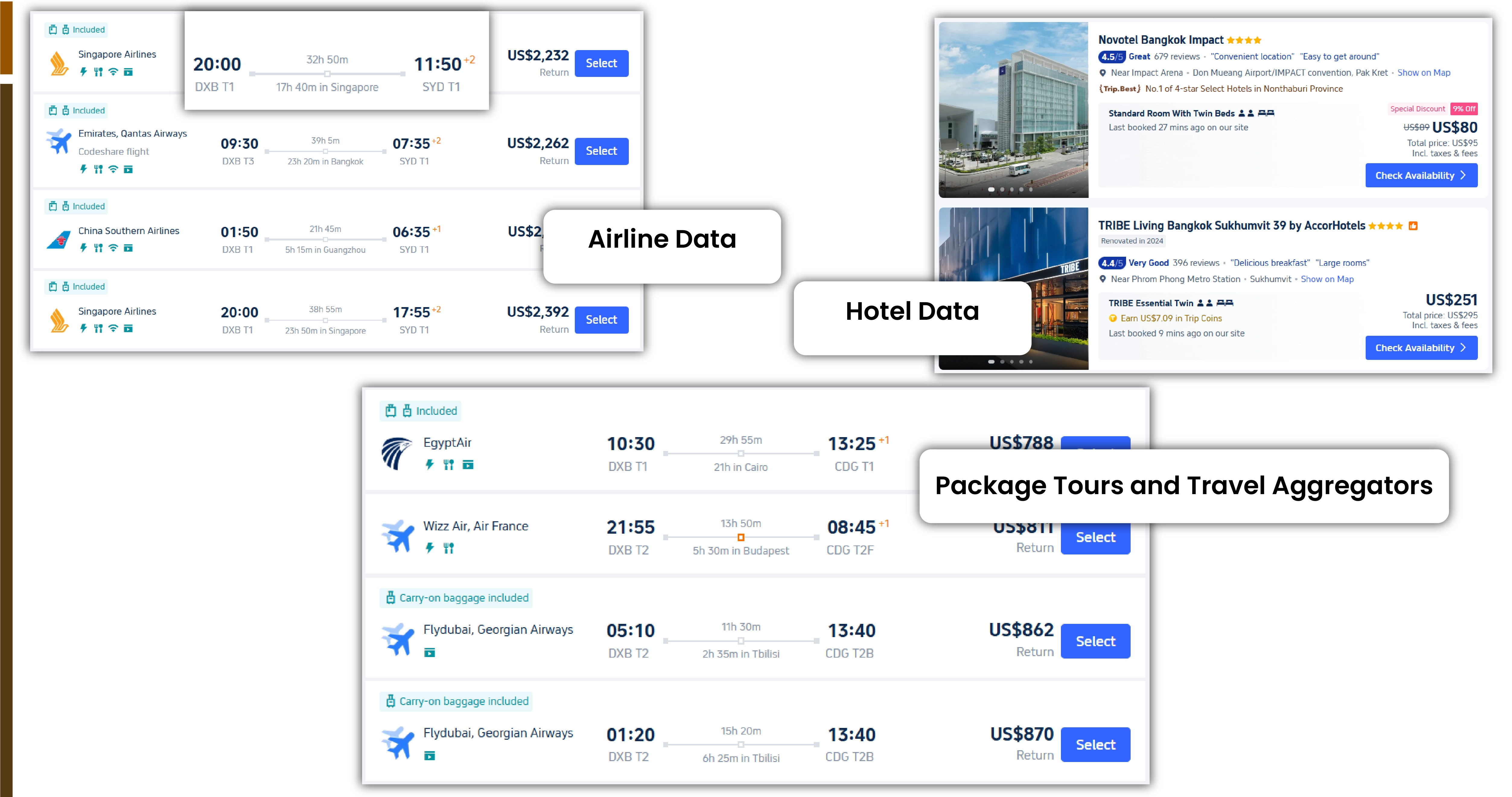
1. Airline Data
Travel, Airline, and Hotel Data Extraction methods are essential for gathering critical information to enhance business strategies. For airlines, this involves collecting:
- Flight schedules and routes to ensure updated and accurate route mapping.
- Real-time ticket prices and availability, which are key for dynamic pricing strategies and customer decision-making.
- Seasonal promotions and loyalty program details, enabling businesses to align their marketing campaigns with airline offers and attract frequent travelers.
2. Hotel Data
Hotels continuously adjust their pricing strategies to remain competitive, making Hotel Data Extraction crucial. This process includes collecting:
- Room availability and rates, ensuring businesses have up-to-date information for comparison and customer recommendations.
- Customer reviews and ratings, offering insights into guest experiences and helping businesses identify top-rated accommodations.
- Special offers and cancellation policies, which are essential for providing flexibility and value to potential customers.
3. Package Tours and Travel Aggregators
Travel packages are increasingly popular, and understanding customer needs requires robust data analysis. Using Travel Data Extraction techniques, businesses can gather:
- Package pricing and inclusions, helping customers compare options and select the best deals.
- Customer preferences for destinations, enabling targeted marketing and personalized recommendations.
- Seasonal trends and peak booking periods, offering insights into high-demand times and assisting in inventory and resource planning.
By leveraging Travel, Airline, and Hotel Data Extraction methods, businesses can stay ahead in the highly competitive travel industry. These techniques provide valuable insights, enabling companies to optimize offerings, enhance customer satisfaction, and maximize revenue.
Applications of Extracted Travel Data
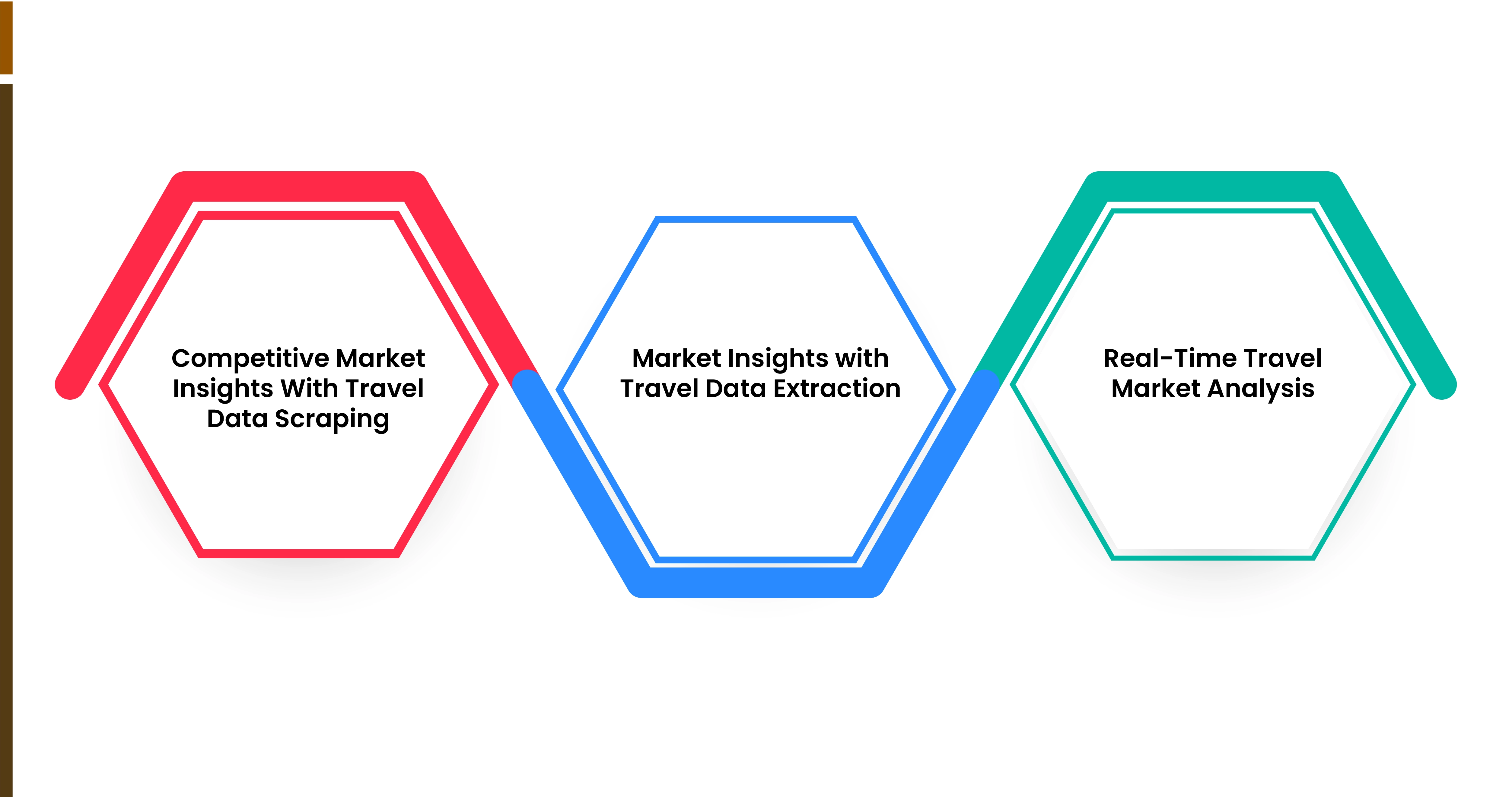
1. Competitive Market Insights With Travel Data Scraping
Analyzing Competitive Market Insights With Travel Data Scraping is a foundational aspect of market intelligence. By leveraging Web Scraping Travel Data for Competitive Market Research, businesses can gain a competitive edge through:
- Comparing pricing models, enabling companies to position their offerings effectively.
- Identifying gaps in competitors’ offerings, allowing for the development of unique value propositions.
- Developing attractive promotions to capture market share, ensuring businesses remain appealing to customers in a competitive environment.
2. Market Insights with Travel Data Extraction
Extracted travel data provides businesses with actionable intelligence. Through Travel Data Extraction, companies can uncover:
- Emerging destinations and travel preferences, helping to tailor marketing campaigns and expand offerings.
- Customer demographics and behaviors, offering insights into target audience segments and their purchasing habits.
- Seasonal demand patterns, guiding resource allocation and marketing efforts during peak and off-peak periods.
3. Real-Time Travel Market Analysis
Access to real-time data enables businesses to stay agile in a rapidly changing market. Utilizing Real-Time Travel Market Analysis, companies can:
- Adjust pricing dynamically based on demand, optimizing revenue and competitiveness.
- Launch timely offers to capitalize on trends, ensuring relevance in a fast-paced industry.
- Respond quickly to market disruptions, such as changes in regulations, travel restrictions, or competitor strategies.
By leveraging Web Scraping Travel Data for Competitive Market Research, Travel Data Extraction, and Real-Time Travel Market Analysis, businesses can stay ahead of the curve. These tools empower companies with the insights needed to develop data-driven strategies, enhance customer satisfaction, and thrive in the dynamic travel industry.
Challenges in Travel Data Extraction
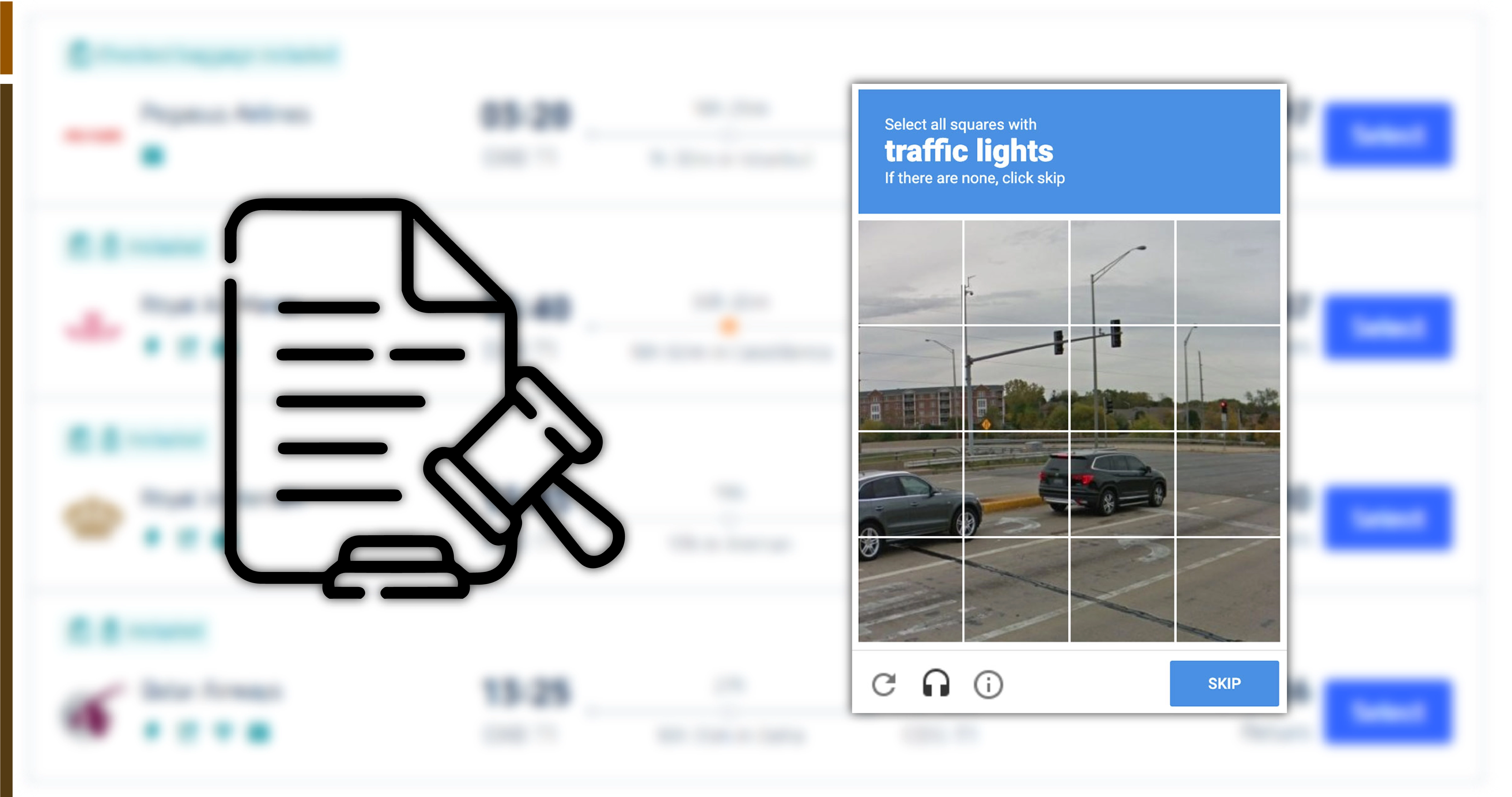
1. Dynamic Websites: Many travel websites use JavaScript to load data, making scraping complex.
2. Legal and Ethical Concerns: Ensure compliance with website terms of service and data privacy regulations.
3. Data Quality: Maintaining accuracy and avoiding duplicates are critical.
Using advanced tools and Travel Scraping API solutions can help overcome these challenges effectively.
Best Practices for Travel Data Extraction
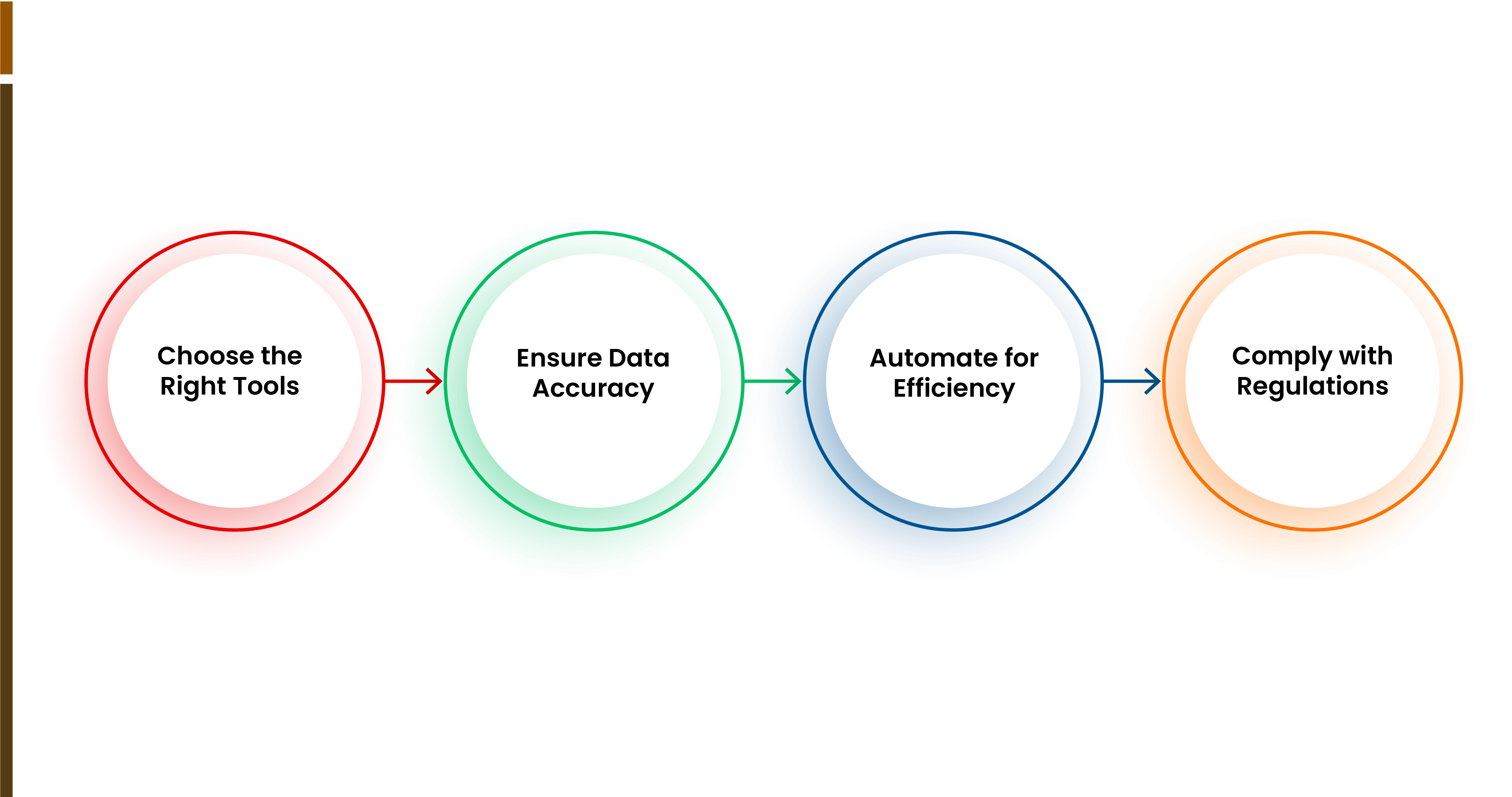
1. Choose the Right Tools: Select reliable scraping tools or APIs tailored for travel data.
2. Ensure Data Accuracy: Regularly validate data to maintain quality.
3. Automate for Efficiency: Leverage automation to handle large datasets effortlessly.
4. Comply with Regulations: Adhere to data usage policies and legal guidelines.
Conclusion
Extracting travel data is an invaluable practice for businesses looking to gain a competitive edge in the travel industry. By leveraging Data Scraping for Travel Market Trends and Analysis, companies can unlock actionable insights into market trends, customer behavior, and competitor strategies. Whether it’s through Travel Industry Web Scraping or using a Travel Scraping API, the possibilities are endless.
For Travel aggregators and startups aiming to make a mark, the ability to Scrape Mobile Travel App Data can provide a significant advantage. Partner with Travel Scrape to access cutting-edge solutions that simplify travel data extraction and empower your business to thrive in a competitive landscape!